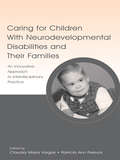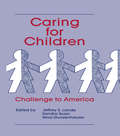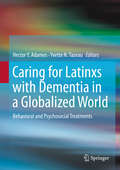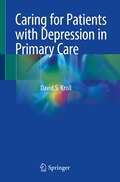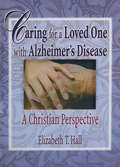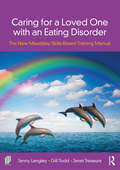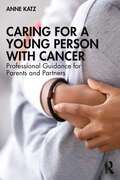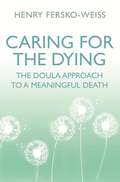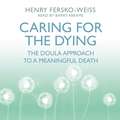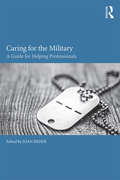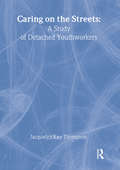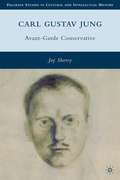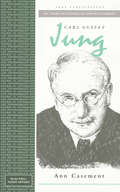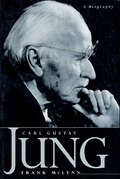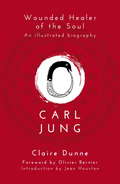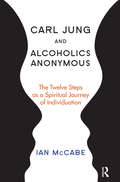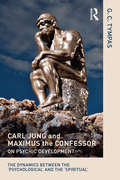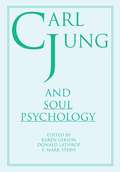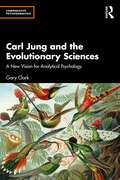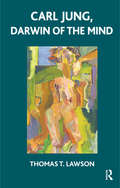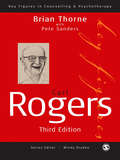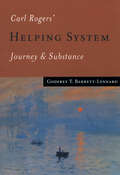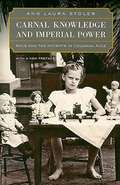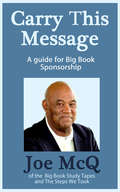- Table View
- List View
Caring for Children With Neurodevelopmental Disabilities and Their Families: An Innovative Approach to Interdisciplinary Practice
by Claudia María VargasChildren with neurodevelopmental disabilities such as mental retardation or autism present multiple challenges to their families, health care providers, and teachers. Professionals consulted by desperate parents often see the problems from their own angle only and diagnosis and intervention efforts wind up fragmented and ineffective. This book presents a model multidisciplinary approach to care--family-centered and collaborative--that has proven effective in practice. A pillar of the approach is recognition of the importance of performing culturally competent assessment and adjusting service delivery so that is responsive to cultural differences. Detailed case stories illuminate the ways in which the approach can help children with different backgrounds and different disabilities. Most chapters include study questions, lists of resources, and glossaries to facilitate easy comprehension by professionals with different backgrounds--in special education, communication sciences, and disorders, clinical and counseling psychology, neuropsychology and psychiatry, social work, pediatrics--and program administrators as well as students, trainees and educated parents. Caring for Children With Neurodevelopmental Disabilities and Their Families constitutes a crucial new resource for all those professionally and personally concerned with these children.
Caring for Children: Challenge To America (Johnson And Johnson Pediatric Round Table Ser. #No. 12)
by Jeffrey S. Lande Sandra Scarr Nina GunzenhauserChildcare is one of the most debated issues today. This volume provides a comprehensive and current review of childcare research and public policy issues. Chapters are contributed by leaders from such fields as developmental research and early childhood education as well as by public policy officials. All major discussions and debates are summarized to promote a complete overview and speak to key issues of the day including affordability, availability, and staffing.
Caring for Latinxs with Dementia in a Globalized World: Behavioral and Psychosocial Treatments
by Hector Y. Adames Yvette N. TazeauThis volume provides a broad and critical presentation of the behavioral and psychosocial treatments of Latinxs with dementia in the United States (U.S.) and across a representative sample of Spanish-speaking countries in the world. The compendium of chapters, written by researchers, practitioners, and policy analysts from multiple disciplines provides a deep exploration of the current state of dementia care for Latinxs in the U.S. and around the globe. The volume is designed to increase and strengthen the collective scientific and sociocultural understanding of the epidemiological and biopsychosocial factors, as well as the overlapping systemic challenges that impact diagnosis and symptom management of Latinxs with dementia. The authors introduce policy options to reduce risk factors for dementia and present culturally-responsive interventions that meet the needs of Latinx patients and their caregivers. Highlighted topics featured in the book include: Contextual, cultural, and socio-political issues of Latinxs with dementia.New meta-analysis of dementia rates in the Americas and Caribbean.Dementia-related behavioral issues and placement considerations.Educational, diagnostic, and supportive psychosocial interventions.Pharmacological, non-pharmacological, and ethnocultural healthcare interventions.Intersectionality as a practice of dementia care for sexual and gender minoritized Latinxs.Prescriptions for policy and programs to empower older Latinxs and their families. Caring for Latinxs with Dementia in a Globalized World: Behavioral and Psychosocial Treatments is a resource that accentuates and contextualizes the heterogeneity in nationality, immigration, race, sexual orientation, gender, and political realities. It is a key reference for a wide range of fields inclusive of demography, geriatrics, gerontology, medicine, mental health, neurology, neuropsychology, nursing, occupational therapy, pharmacology, psychiatry, psychology, rehabilitation, social work, sociology, and statistics all of which, collectively, bear on the problem and the solutions for better care for Latinxs affected by dementia.
Caring for Patients with Depression in Primary Care
by David S. KrollDepression is the leading cause of disability in the United States, and the traditional framework for managing depression within a psychiatry practice—i.e., a single psychiatrist treating a single patient for up to an hour per week—comes up painfully short at the level of serving the population even if it can be highly effective for individuals. At the same time, the non-systematic way in which most patients identify the need to see a specialty provider in behavioral health leaves many stranded, regardless of how complex their needs are. Primary care is now often considered the “de facto mental health system” in the United States, and primary care providers have been charged with the impossible task of making up for the dearth of psychiatric specialty providers and somehow correcting the many inequities in access to care that remain. Primary care providers shouldn’t have to do this alone. Help can come in many forms, of course, and some primary care practices are lucky enough to have a consulting psychiatrist on-site, available to answer any questions that come up and see patients directly when they need an expert opinion. This is exactly what David S Kroll, MD, an Associate Vice Chair in the Department of Psychiatry at Brigham and Women’s Hospital in Boston and an Assistant Professor at Harvard Medical School, does for a primary care practice that serves more than 17,000 patients with a wide range of medical, social, and psychiatric problems. But most primary care practices don’t have this resource. This book replicates the expertise of a consulting psychiatrist in a concise volume that primary care providers can pull off their shelves whenever they have a question about managing depression. It ensures that no one has to do this on their own. Managing Depression in Primary Care contains fourteen chapters that anticipate the questions, problems, and practical challenges that are most likely to come up when managing depression in primary care. It covers the basic skills that are needed for treating depression when it occurs in a vacuum, but it also provides practical guidance on treating depression in the real world—where it will inevitably be complicated by other factors. It also covers important associated topics including suicide, substance use, and disability.
Caring for a Loved One with Alzheimer's Disease: A Christian Perspective
by Harold G Koenig Elizabeth T HallClarify your thinking on an issue that can tear families apart!Caring for a Loved One with Alzheimer’s Disease: A Christian Perspective is the touching story of a woman’s daily struggles as a caregiver to her mother who suffers from Alzheimer’s disease. You’ll learn how God’s presence in her life has helped her. You will also find practical day-to-day tips for living with a loved one suffering from senile dementia and how your spirituality can make the journey easier for both of you. This important guide provides an honest description of the emotions you may be forced to come to terms with while dealing with a loved one or parishioner with Alzheimer’s disease and how God’s presence in your life can help lift that burden.Caring for a Loved One with Alzheimer’s Disease gives you firsthand accounts of the stages of pain, despair, acceptance, and victory that you may experience while caring for someone with Alzheimer’s to let you know that what you are feeling is normal and that God will help you overcome these challenges. Alzheimer’s disease often goes undetected until its later stages. This informative book renders a clear description of the disease, alerting you to the known warning signs of dementia, and preparing you for the possibility of such a diagnosis.Caring for a Loved One with Alzheimer’s Disease is filled with tips and suggestions to make caring for your loved one easier for both of you, such as: learning to separate the person from the disease researching the disease and keeping informed about every aspect of this progressive and irreversible neurological disorder realizing that you need emotional support and should seek help from your pastor, church care group, or best friend discovering how having power of attorney and creating a living will can prevent many problems in the future understanding that to care for your loved one at home is challenging and that taking simple steps, such as “baby-proofing” your house, will prevent traumatic disasters turning your anger and guilt to positive energy and avoiding emotional drain and strainThis unique book offers you solace amidst the turbulence of caring for someone stricken with this difficult condition. Caring for a Loved One with Alzheimer’s Disease provides an open and honest description of how faith can comfort and support you and your family while you care for someone with dementia.
Caring for a Loved One with an Eating Disorder: The New Maudsley Skills-Based Training Manual
by Janet Treasure Jenny Langley Gill ToddCaring for a Loved One with an Eating Disorder: The New Maudsley Skills-Based Training Manual provides a framework for carer skills workshops which can be used by anyone working with these conditions. Based on the successful New Maudsley Model, which equips carers with the knowledge and skills needed to support those with an eating disorder, the book consists of two sections which will help facilitators to deliver skills workshops to carers. The first section provides the theoretical background, while the second uses exercises to bring the New Maudsley Model to life. The skills workshops provide a much-needed lifeline, giving carers an opportunity to meet in a safe, non-judgemental and confidential environment, and to learn to recognise that changes in their own responses can be highly beneficial. With session-by-session guidelines and handouts for participants, Caring for a Loved One with an Eating Disorder: The New Maudsley Skills-Based Training Manual will be of aid to anyone working with someone coping with these conditions.
Caring for a Young Person with Cancer: Professional Guidance for Parents and Partners
by Anne KatzThis book is an accessible, sensitive, and evidence-based resource for partners, parents, and other family members navigating the heartache and challenges of caring for a young adult with cancer. When a young person you love is diagnosed with cancer, the impacts on partners and parents is life-altering. In this book, Anne Katz offers her unique perspective as a counselor to help family members as their child or partner goes through diagnosis, treatment, and the years of survivorship. Interweaving clinical practice with evidence-based tips and interventions, each chapter presents the story of a young person with cancer and how the illness impacts those that love them with Dr. Katz providing gentle, targeted advice throughout. The chapters include individuals from diverse backgrounds, such as people across different ages, gender identities, ethnicities, and sexual orientations, as well as reflective questions, with topics covering treatment decision-making, how to care during treatment, letting go, and a resource section pointing readers to where they can seek help. Written by a leading voice in the field of cancer, the stories and advice provided in this book will help all families and partners apply the lessons learnt to their lived experiences. It will be also of interest to health care providers working with these families, such as clinical social workers and nurses.
Caring for the Dying: The Doula Approach to a Meaningful Death
by Henry Fersko-WeissA gentle guide for end of life care aimed at families and caregivers.Caring for the Dying describes a whole new way to approach death and dying. It explores how the dying and their families can bring deep meaning and great comfort to the care given at the end of a life. Created by Henry Fersko-Weiss, the end-of-life doula model is adapted from the work of birth doulas and helps the dying to find meaning in their life, express that meaning in powerful and beautiful legacies, and plan for the final days. The approach calls for around-the-clock vigil care, so the dying person and their family have the emotional and spiritual support they need along with guidance on signs and symptoms of dying. It also covers the work of reprocessing a death with the family afterward and the early work of grieving.Emphasis is placed on the space around the dying person and encourages the use of touch, guided imagery, and ritual during the dying process. Throughout the book Fersko-Weiss tells amazing and encouraging stories of the people he has cared for, as well as stories that come from doulas he has trained and worked with over the years.The guidance provided can help a dying person, their family, and caregivers to transform the dying experience from one of fear and despair into one that is uplifting and even life affirming. You will see death in a new light and gain a different perspective on how to help the dying. It may even change the way you live your life right now.
Caring for the Dying: The Doula Approach to a Meaningful Death
by Henry Fersko-WeissA gentle guide for end of life care aimed at families and caregivers.Caring for the Dying describes a whole new way to approach death and dying. It explores how the dying and their families can bring deep meaning and great comfort to the care given at the end of a life. Created by Henry Fersko-Weiss, the end-of-life doula model is adapted from the work of birth doulas and helps the dying to find meaning in their life, express that meaning in powerful and beautiful legacies, and plan for the final days. The approach calls for around-the-clock vigil care, so the dying person and their family have the emotional and spiritual support they need along with guidance on signs and symptoms of dying. It also covers the work of reprocessing a death with the family afterward and the early work of grieving.Emphasis is placed on the space around the dying person and encourages the use of touch, guided imagery, and ritual during the dying process. Throughout the book Fersko-Weiss tells amazing and encouraging stories of the people he has cared for, as well as stories that come from doulas he has trained and worked with over the years.The guidance provided can help a dying person, their family, and caregivers to transform the dying experience from one of fear and despair into one that is uplifting and even life affirming. You will see death in a new light and gain a different perspective on how to help the dying. It may even change the way you live your life right now.Read by Barry Abrams(p) 2017 Tantor Media
Caring for the Military: A Guide for Helping Professionals
by Joan BederWith overseas deployment scaling down in recent years, helping professionals need practical tools for working with servicemen and women returning from deployment. Caring for the Military, with its case studies and clinical discussions, is indispensable for social workers and other helping professionals working with these populations. Leading experts contribute chapters on the challenges faced by reintegrating members of the military, including returning to a family, entering the workforce, and caring for those with PTSD, TBI, and moral injury. This text also features unique chapters on telemental health, multidisciplinary settings, and caregiver resiliency.
Caring on the Streets: A Study of Detached Youthworkers
by Jacqueline K ThompsonThey're fighting for our kids, and the battleground is the street!In 1956, the Boston Special Youth Project defined the field of detached youthwork this way: “Detached work involves intensive contact with a corner-group where the worker meets the teen-age group in their natural environment. By close association with them and getting to know their needs as a group and as individuals, the worker forms a positive relationship and helps them to engage in socially acceptable activities which they come to choose. The basic goal is helping them to change undesirable attitudes and patterns of behavior.”Today, author and youthworker Jacquelyn Kay Thompson brings this exciting, heartbreaking and often dangerous profession to light in Caring on the Streets: A Study of Detached Youthworkers. The book examines the demanding task of assisting runaways, gang members, prostitutes, drug addicts, and other troubled youths and explores how the profession is practiced in the United States. Here are true-life stories of the courageous, caring individuals whose professional life is spent on the streets, in bars, pool halls, motels, housing projects, and hangouts “where the kids are.” In addition to sharing the personal experience of detached workers, Caring on the Streets illuminates these facets of the profession: history of detached youthwork methodology and philosophy of detached youthwork model programs research procedures for youthworkers becoming a detached youthworker ...and more!Caring on the Streets contains interviews with seventeen youthworkers who assist clients outside of formal office settings to give you insight into the experiences, challenges, and dedication of detached youthworkers. This thoughtfully-indexed work also includes reference notes and five appendixes.
Carl Gustav Jung
by Jay SherryCarl Gustav Jung has always been a popular but never a fashionable thinker. His ground-breaking theories about dream interpretation and psychological types have often been overshadowed by allegations that he was anti-Semitic and a Nazi sympathizer. Most accounts have unfortunately been marred by factual errors and quotes taken out of context; this has been due to the often partisan sympathies of those who have written about him. This book provides a more accurate and comprehensive account of Jung's controversial opinions about art, politics, and race.
Carl Gustav Jung (Key Figures in Counselling and Psychotherapy)
by Ms Ann Casement`This book offers a fresh and full introduction to Jung's psychology - it will be appreciated by many, from novice counsellors to the well-read analyst who will find... that there is much to learn about C G Jung' - Journal of Analytical Psychology `Ann Casement achieves an almost impossible task in her contribution to this useful series from SAGE, namely to create a lively overview of a complex man and his equally complex contributuions to analytic psychotherapy.... Casement achieves in this short book what Jung may have hoped to do when he reported a dream following a meeting with a publisher who was encouraging him to write a popular text of his ideas for the non-specialist. He had rejected the idea out of hand, but later he had a dream that changed his mind. "Jung found himself `standing in a public place addressing a great multitude of people who were listening to him with rapt attention and understanding what he said'" ' - Self & Society `Clearly written and well-informed, this impressive book is likely to become the single volume of choice for those psychotherapists and counsellors engaging with Jung and Jungian psychology as part of their training (whether wholly Jungian or more pluralistic). Ann Casement writes as an informed and enthusiastic insider who has also managed to retain her critical distance - hence what she has to say will also be relevant to more experienced readers' - Andrew Samuels, University of Essex Carl Gustav Jung is an enlightening and insightful guide to the life and work of one of the founding fathers of psychotherapy and most influential thinkers in modern times. Combining insights from his early life and his wide-ranging intellectual interests in philosophy, mysticism and parapsychology, Ann Casement traces the development of Jung's ideas on the functioning of the human mind, including the origins of core Jungian concepts such as archetypes, teleology, alchemy and the collective unconscious. Examining the relationship between Freud and Jung through their prolific correspondence, the author charts the growing divergence of opinion, which culminated in the birth of analytical psychology, the branch of psychotherapy established by Jung. Notwithstanding his unquestionable contribution to modern intellectual thought, Jung has been subject to severe criticism, including allegations of anti-Semitism and sympathy with the Nazi party. The book sets out clearly both the arguments levelled against Jung and responses to his critics. Particularly for the reader new to Jungian thinking, this book places the central concepts fully into context and provides the ideal starting point for further study of Jung and his work. Ann Casement is a Jungian Analyst in Private Practice, London and Chair of the United Kingdom Council for Psychotherapy. Her previous publications include Post-Jungians Today.
Carl Gustav Jung: A Biography
by Frank McLynnIn this, the first full-length biography of the great Swiss psychologist, Carl Gustav Jung is remembered not only for his valuable contribution to psychotherapy and to our understanding of the inner workings of the mind, but for the enduring controversies he sparked. In Frank McLynn's capable hands, readers will come to understand the man who originated what are widely held to be some of the greatest ideas of this century.
Carl Jung
by Claire DunneThis is the first fully-illustrated biography of one of the greatest thinkers of the 20th century, famous for his pioneering exploration of dreams, the unconscious, and spirituality. Carl Jung continues to be revered today as a true revolutionary who helped to shape psychology, provided a bridge between Western and Eastern spirituality, and brought into general awareness such fundamental concepts as archetypes, the collective unconscious, and synchronicity. In this important book, Claire Dunne chronicles Jung's journey of self-discovery from a childhood filled with visions both terrifying and profound, through his early professional success, to his rediscovery of spirituality in mid-life. Special attention is paid to the tumultuous relationships between Jung and Sigmund Freud, the unconventional yet vital role performed by his colleague, Toni Wolff, and the revelatory visions Jung experienced following a close brush with death.The words of Jung himself and those who shared his work and private life are shared verbatim, connected by Claire Dunne's lively and accessible commentary and by an evocative array of illustrations including photographs of Jung, his associates, and the environments in which he lived and worked, as well as art images both ancient and contemporary that reflect Jung's teachings. Jung emerges as a healer whose skills arose from having first attended to the wounds in his own soul.This is an essential work of reference as well as a fascinating and entertaining read for everyone interested in psychology, spirituality, and personal development.From the Trade Paperback edition.
Carl Jung and Alcoholics Anonymous: The Twelve Steps as a Spiritual Journey of Individuation
by Ian McCabeThe author visited the archives of the headquarters of A.A. in New York, and discovered new communications between Carl Jung and Bill Wilson. For the first time this correspondence shows Jung's respect for A.A. and in turn, its influence on him. In particular, this research shows how Bill Wilson was encouraged by Jung's writings to promote the spiritual aspect of recovery as opposed to the conventional medical model which has failed so abysmally. The book overturns the long-held belief that Jung distrusted groups. Indeed, influenced by A.A.'s success, Jung gave "complete and detailed instructions" on how the A.A. group format could be developed further and used by "general neurotics".Wilson was an advocate of treating some alcoholics with LSD in order to deflate the ego and induce a spiritual experience. The author explains how alcoholism can be diagnosed and understood by professionals and the lay person; by examining the detailed case histories of Jung, the author gives graphic examples of its psychological and behavioural manifestations.
Carl Jung and Maximus the Confessor on Psychic Development: The dynamics between the ‘psychological’ and the ‘spiritual’
by G. C. TympasIn what ways does psychological development differ from spiritual development and psychological experience from spiritual experience? Bringing together two disparate theories under a trans-disciplinary framework, G. C. Tympas presents a comparison of Carl Jung’s theory of psychic development and Maximus the Confessor’s model of spiritual progress. An ‘evolutional’ relationship between the ‘psychological’ and the ‘spiritual’ is proposed for a dynamic interpretation of spiritual experience. Carl Jung and Maximus the Confessor on Psychic Development offers a creative synthesis of elements and directions from both theories and further explores: - Jung’s views on religion in a dialogue with Maximus’ concepts - The different directions and goals of Jung’s and Maximus’ models - Jung’s ‘Answer to Job’ in relation to Maximus’ theory of ‘final restoration’. Tympas argues that a synthesis of Jung’s and Maximus’ models comprises a broader trans-disciplinary paradigm of development, which can serve as a pluralistic framework for considering the composite psycho-spiritual development. Constructively combining strands of differing disciplines, this book will appeal to those looking to explore the dialogue between analytical psychology, early Christian theology and Greek philosophy.
Carl Jung and Soul Psychology
by Karen Gibson E Mark Stern Donald LathropPsychotherapy is profoundly indebted to Carl Jung, who among others, discovered the mappings of soul psychology. Carl Jung and Soul Psychology is a fascinating exploration of the identity and unifying work of soul psychology. The editors have met a monumental challenge in enlisting the scope of wisdom represented in this unique book.
Carl Jung and the Evolutionary Sciences: A New Vision for Analytical Psychology (Comparative Psychoanalysis)
by Gary ClarkThis book revaluates Carl Jung’s ideas in the context of contemporary research in the evolutionary sciences.Recent work in developmental biology, as well as experimental and psychedelic neuroscience, have provided empirical evidence that supports some of Jung’s central claims about the nature and evolution of consciousness. Beginning with a historical contextualisation of the genesis of Jung’s evolutionary thought and its roots in the work of the 19th century Naturphilosophen, the book then outlines a model of analytical psychology grounded in modern theories of brain development and life history theory. The book also explores research on evolved sex based differences and their relevance to Jung’s concept of the anima and animus.Seeking to build bridges between analytical psychology and contemporary evolutionary studies and associated fields, this book will appeal to scholars of analytical and depth psychology, as well as researchers in the evolutionary and brain sciences.
Carl Jung, Darwin of the Mind
by Thomas T. LawsonCarl Jung, Darwin of the Mind is a review and an explanation of Jung's thought set in an evolutionary context. Jung explored the human psyche throughout his long life. His writings, of astonishing scope and depth, elaborate on imagery that can be found in rituals, myths and fables worldwide as well as in the dreams, visions and fantasies of his patients and himself. Jung pursued common threads of meaning to the point of becoming deeply versed in the esoterica of Eastern mysticism, Gnosticism, and alchemy. Taken collectively, Jung's works develop a coherent theory about how the psyche is constructed, including an idea of how consciousness emerged as a part of it. The author demonstrates that Jung's concept of a collective unconscious structured by archetypes meshes well with accepted views of evolution and can be squared with the most rigorous science of today. So taken, Jung's work is of unrivaled explanatory power and opens new vistas for understanding who we are and how we function.
Carl Rogers (Key Figures in Counselling and Psychotherapy)
by Pete Sanders Brian ThorneAs founder of the person-centred approach, Carl Rogers (1902-1987) is arguably the most influential psychologist and psychotherapist of the 20th century. This book provides unique insights into his life and a clear explanation of his major theoretical ideas. This Third Edition is co-authored by Brian Thorne and Pete Sanders, leading person-centred practitioners and bestselling authors. Pete Sanders contributes a new chapter on "The Ongoing Influence of Carl Rogers", covering topics such as research, the emerging tribes in person-centred tradition, and its interaction with the medical profession. Brian Thorne draws on his experience of having known and worked with Rogers to beautifully describe the way in which Rogers worked with clients and from that, to draw out the practical implications of what is, in effect, a functional philosophy of human growth and relationships. In the twenty years since the first edition of Carl Rogers appeared, the book has continued to provide an accessible introduction for all practitioners and students of the person-centred approach.
Carl Rogers' Helping System: Journey & Substance
by Godfrey T. Barrett-Lennard`This book is a monumental achievement, and person-centred practitioners will be indebted to Goff Barrett-Lennard for many years to come. He has written no only a definitive study of the history of person-centred approach - what he calls a report of the "evolutionary course of a human science" - but also an accompanying commentary which is unfailingly enlightening, sometimes provocative and occasional lyrical' - Brian Thorne, Emeritus Professor of Counselling, University of East Anglia and Co-Founder, Norwich Centre `I highly recommend this book as a reference source of major import, as bibliography, as history as art, and as a complex discussion of questions that plague the person-centred practitioner and the client-centred therapist' - The Person-Centered Journal `If you only ever buy one book about the Person-Centred Approach, other than those written by Rogers himself, this is the one. It is a staggering achievement by one of the most knowledgeable writers in the field' - PCP Reviews `This book is a gem, and should have wide appeal. It is an excellent introduction to person-centred psychology, written in accessible style, and it takes the reader beyond the simplicity often confused with naivety Goff Barrett-Lennard reveals a sophisticated complexity that challenges us to view the "person" with fresh eyes and an open mind' - Tony Merry, University of East London `I strongly recommend this book as a sophisticated treatment of the client-or person-centred approach to therapy and its applications to areas outside therapy. It is also a useful overview of research on all aspects of person-centred ideas' - Psychotherapy Research `This book. . . is not a single "meal" in itself but a positive "larder" containing every imaginable staple food and condiment all exquisitely and thoroughly researched. The book took Godfrey T Barrett-Lennard 20 years to write and it will stand as a reference text for person-centred specialists for longer than that. . . an essential reference text. . . and a pantry full of delicious surprises' - Counselling and Psychotherapy, The Journal of the British Association for Counselling and Psychotherapy `Probably the most important piece of work on the person-centred approach to have emerged in recent years. . . an essential source of reference for anyone with a serious interest in the person-centred approach' - Counselling News Written by an ex-student and long-time colleague of Carl Rogers, this in-depth and challenging book charts the development of person-centred therapy from its origins through to the present day. Godfrey T Barrett-Lennard traces the central concepts and key figures within the movement, set against the contemporary historical, social and political context. As an integrated overview of the person-centred approach, Carl Rogers' Helping System presents a wealth of fascinating ideas and information which is linked to a fresh, incisive account of the unfolding theory, process and research.
Carnal Knowledge and Imperial Power: Race and the Intimate in Colonial Rule
by Ann Laura StolerContending that social classification is not a benign cultural act but a potent political one, Stoler shows that matters of the intimate were absolutely central to imperial politics. Stoler looks discerningly at the way cultural competencies and sensibilities entered into the construction of race in the colonial context and proposes that "cultural racism" predates its postmodern discovery.
Carnal Knowledge and Imperial Power: Race and the Intimate in Colonial Rule, With A New Preface
by Ann Laura StolerThis landmark book tracks matters of intimacy to investigate matters of state in late nineteenth and early twentieth century Indonesia, particularly the critical role played by sexual arrangements and affective attachments in creating colonial categories and distinguishing the ruler from the ruled. Arguing that social classification is not a benign cultural act but a potent political one, Ann Laura Stoler's essays focus on parents and parenting, nursing mothers, servants, orphanages, and abandoned children to reveal why they were understood as so essential to imperial governance and why they have been so consistently absent from its historiography. In a new preface, Stoler takes up a broad range of problematics raised in the first edition, including the analytics of comparison, the treatment of the intimate, and more.
Carry This Message (Addiction Recovery Ser. #7)
by Joe McQ“Having had a spiritual awakening as the result of these Steps, we tried to carry this message to others, and to practice these principles in all our affairs.”-STEP 12 of the TWELVE STEPSSponsorship is a key construct in A. A. and other Twelve Step groups, and the twelfth step is the foundation of the sponsorship dynamic essential to recover – both for the sponsor and the sponsoree.This book addresses the concern of many in the A. A. community that sponsors have lost some skills in working with alcoholics. By offering tools for helping others find recovery and new life through the Twelve Step program, Joe McQ has created a guide for sponsors to use in working with others.By refocusing his readers on the Big Book, the Twelve Steps, and their message, McQ appeals for a return to the roots and essence of the A. A. program. Moreover, he issues a strong call to action, for return to the fullness and the integrity of the miraculous recovery program.
